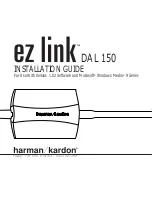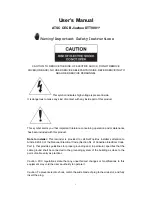
12. For 3D photographers, bal-
ance between left and and
right frame sizes is very im-
portant. With Loreo 3D lenses,
the perceived position of the
center line can sometimes be
misleading.
With an SLR camera, the pres-
ence of mirrors prevents the
partition between the image
pair being extended all the way
to the film plane. As a result,
the center line can never be
clearly defined. There will
always be some overlap. Even
with mirrorless DSLR cameras,
in which the partition can be
set much closer to the film
plane, there is still a gap.
For this reason, the 9005 3D
lens has been set up to pro-
duce images with an overlap
as opposed to a thick dark
band down the middle. The fol-
lowing two images were taken
with the same 3D Lens in a
Cap 9005 on the same DSLR
camera.
In the first image (above), the
right hand frame seems to en-
croach upon the center line. In
the second image, the two sides
appear to be well balanced. Sub-
ject matter and lighting make all
the difference.
13. Internal reflection will occa
-
sionally cause flare, which is
visible in the viewfinder. Some
-
times a ghost image will ap-
pear. This can be avoided by
shifting the angle of the lens,
or shielding the side to avoid
light shining directly in. Hoods
can also be added using the
filter mounts in the front.
Ghost image
14. 3D images taken with this lens
are best viewed with Loreo
3D print and screen viewers.
Some people can freeview
3D images. The image pairs
have a high degree of cor-
respondence, so feel free to
experiment with viewing meth-
ods which require symmetry
(anaglyphs).
15. Image pairs are not pitch-
adjusted for cropping as in film
printing days. Some may find
fusing 4R prints on a Deluxe
3D Viewer difficult. If so, use
3R prints. Viewing with the Lite
and Pixi Viewers should not be
a problem.
16. Different people have differ-
ent eyesight, so you may have
to move the viewer closer or
further away from your eyes
for the stereo effect to appear.
17. Tips for taking dramatic 3D
pictures: As in conventional
photography, the subject will
usually be placed in the center
of the picture composition, and
exposure is best if the light
source is behind the photogra-
pher.
18. When taking pictures you can
point your camera slightly up
or down, but always keep it
horizontal. Never hold your
camera vertical, since you
would not be able to view the
pictures in 3D.
19. Avoid the subject being too
close to the lens (<1.5 m).
This leads to discomfort in
viewing. Avoid there being too
much empty space between
foreground and background
if closeup shots are taken of
a subject at 1.5m, the back-
ground should not be more
than 3 meters away.
The subject in this picture is the
parrot. It is too close to the lens,
so parallax compensation no
longer works. Note how the par-
rot does not appear in the same
relative position in each frame.






















